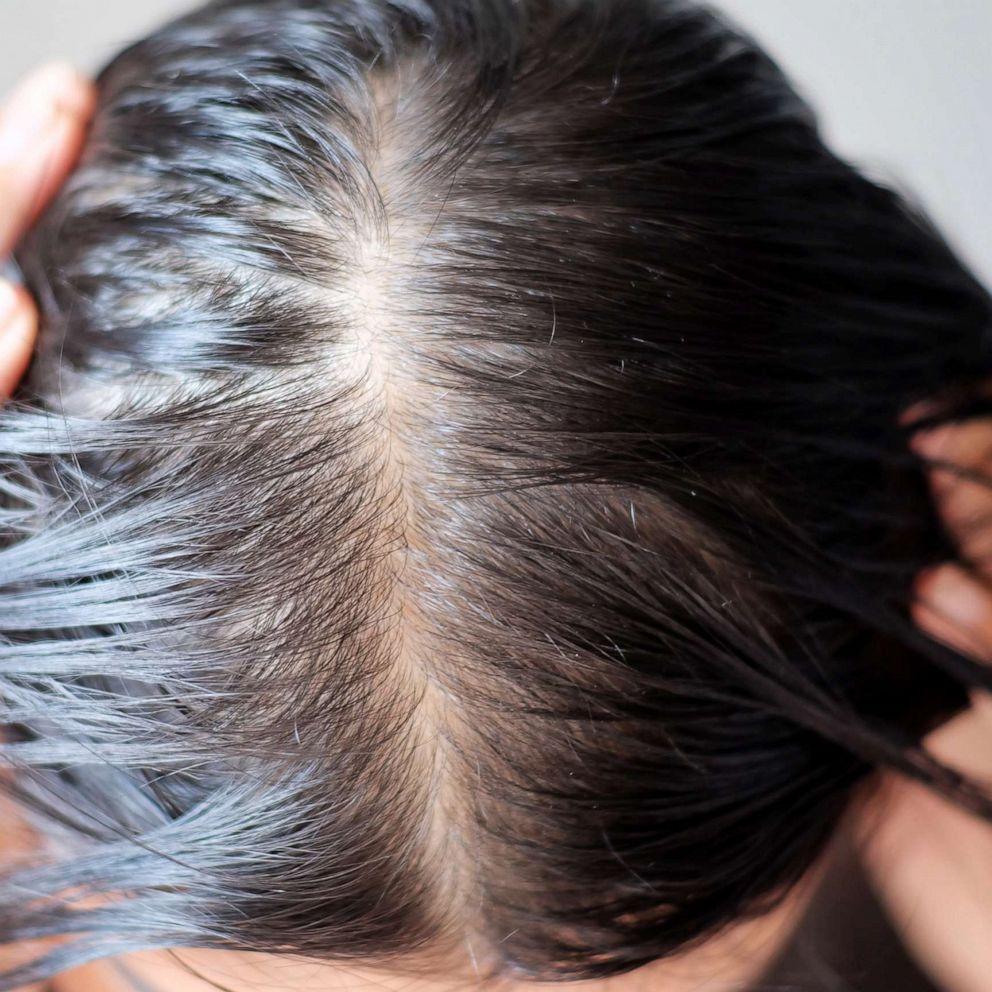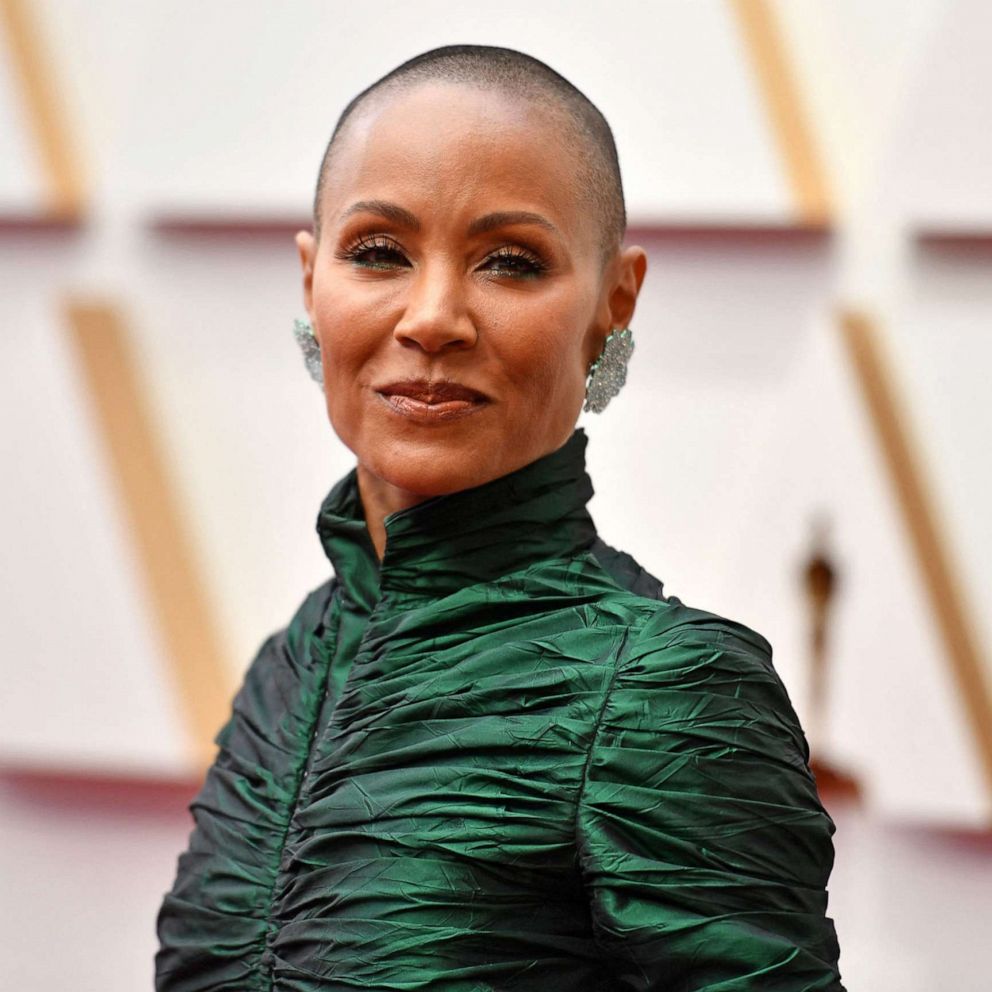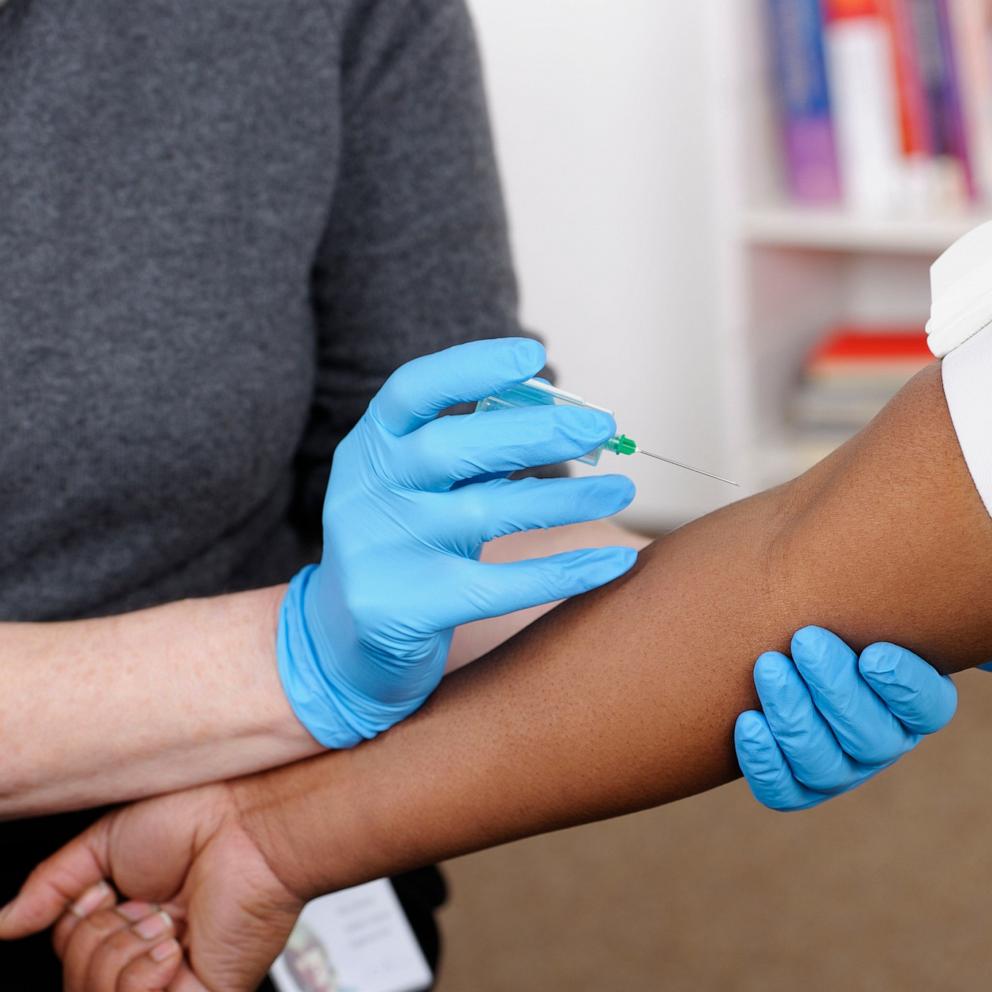Tired of trying to hide hair loss, these women are embracing being bald
Felicia Flores was in her early 20s and in the middle of raising her 1-year-old daughter when she said she noticed bald spots on her head.
Flores, who lives in Atlanta, went to a dermatologist, who diagnosed her with alopecia areata, a disease that develops when the body attacks the hair follicles, causing hair loss, according to the American Academy of Dermatology Association, or AADA.
For the next six years, Flores, now 45 and a mom of two, said she underwent various treatments to try to get her hair to grow back and prevent further hair loss, and wore her hair in styles that would cover the bald spots as much as possible.
Shortly before her 30th birthday, tired of painful treatments that she said worked only temporarily, Flores decided to shave her head.
"I was kind of tired of that false hope and just said, 'Forget about it,'" she told "Good Morning America," adding that she had never even heard of alopecia before her diagnosis.
"I just threw a wig on and dealt with it," she added. "I said, 'Where there's a wig, there's a way.' That was my life."

Flores said very few people in her life knew she was bald as she kept it hidden from even her closest family and friends.
While working as both a cosmetologist and a flight attendant, Flores kept up appearances by wearing wigs daily for the next nearly decade. She described forgoing some of her favorite activities -- like swimming and riding roller coasters -- during that time, and living in fear that her secret would be exposed.
"I was definitely embarrassed by it and ashamed, per se, of it at the time, so I just hid it," Flores said. "Your hair is your crown, that's what you've been told, so with the popularity of hair extensions and weaves and all this stuff, where was that place for the 'baldie?' It wasn't really out there."
Flores recalled that during most of her journey with alopecia, she did not have any female public figures to look to for embracing baldness.
She said it was only after Amber Rose, a model who dated Kanye West for several years, took the spotlight that she saw a woman like herself with a bald head, wearing it proudly in public.
"I'd never seen a woman where she's feminine and she's rocking a bald head. I was like, 'Oh, it can be done,'" Flores said. "That was what gave me that inspiration, like, no, I can still be myself. I can still be feminine. I can still show up as my authentic me and embrace myself, because she's doing it."
She added of Rose, "I wasn't even paying attention to Kanye. I saw her and she was absolutely gorgeous and fabulous, so she inspired me to say, 'No, you can be bald and beautiful.'"
Ignoring the stares, questions that come with embracing bald
Inspired by Rose, as well as her own daughter, who encouraged her mom to embrace her bald head, Flores said she decided to stop wearing wigs around a decade ago.
At the time, Flores said she had also begun dating more and became more self-conscious about wearing wigs, saying she "didn't want to lie anymore."
"I felt like if I'm going to be out in this dating world, I want to meet somebody who sees me for me, and I don't have to go through the theatrics of coming out and trying to explain to them that I'm bald," Flores said. "I just wanted them to see me. You like me? This is it. What you see is what you get."

Flores described going wig-free as liberating but said one challenging aspect was the attention she suddenly received due to her baldness.
"Before when I wore a wig, I blended in. I was normal, just like everyone else. And now here it is, I'm like, standing out with this baldie," Flores said. "That was one of the main things I had to kind of get over, was the staring."
Flores said she also struggled to explain to people that her baldness didn't mean she was sick with cancer or another type of life-threatening disease.
Alopecia areata is an autoimmune disease that affects people of all ages, genders and races, according to the AADA.
Chloe Marie Bean, who was diagnosed with alopecia areata at age 8, said she also struggled to explain to people why she was losing her hair.
"I remember my parents got a [video] from my doctors, and I had to show it in my elementary classes, because hats weren't allowed, and kids were like, 'Why are you the only one allowed to wear hats?'" Bean, now 24, told "GMA." "We tried to educate them with an explainer of what alopecia was, because people thought I was sick."
Bean said she shaved her head her junior year of high school, by which time she had lost 90% of her hair, and then went back and forth between wearing wigs and trying to embrace her baldness.
"I remember I would go bald here and there, but it was hard ... in high school I almost was homeschooled because I was getting bullied," she said. "People were saying I was a guy, all these crazy things that I'm sure people deal with a lot, and still do [these days] on social media."
In college, Bean made the decision to both stop doing treatments for alopecia and to fully embrace being bald.
It was also in college that Bean began to share more of her alopecia journey on social media, which she said opened her eyes to the realization that she was not alone.
"I shared my story on TikTok, and when I did, I panicked because a video I made got, like, 30 million views," she said. "But I don't think I'd be where I am right now if I didn't share my story publicly, because it introduced me to a community that I never knew I needed."
Bean now has more than 2 million followers combined on TikTok and Instagram, where she shares her life, her business -- a wig and brow company called Baldie Bean -- and beauty tips for women with alopecia.
"I feel like it heals my inner child," she said of sharing her story with others. "When I used to deal with this, I thought I was alone, and social media helps me help people realize that embracing your flaws is what makes you so unique and beautiful. I started my own business because of that, embracing alopecia ... I'm helping people feel beautiful."
Building a community that embraces bald
As Flores grew into her identity as a person who is bald, she said she too began to share more of her story with people in her life and on social media.
Instead of her world crashing, as she said she expected, Flores described feeling completely "embraced."
"The amount of love... I was just embraced by everyone, and when it came to dating, it was like they liked me more," she said. "So, that's what I'm saying when I say, 'Just be you,' because they're going to like you for you, and you will be embraced."

Inspired by the community of support she felt in her own life, Flores said she poured her life savings into what she describes as her "passion project," an annual conference known as Baldie Con.
Baldie Con, which was held in September this year in Atlanta, is a two-day gathering for women who have hair loss issues, whether from alopecia or any other condition.
"That's what makes Baldie Con so special, is that we're inclusive," Flores said. "I just want them to be recognized for being special and beautiful and to know that they're loved and know that there's a community out there for them to embrace and to have any kind of information that's out there, whether it's about hair loss, different remedies, treatments."
Shadina Blunt, a 38-year-old mom of three, was a speaker at this year's Baldie Con event.

Blunt said she lost her hair due to chemotherapy treatments for invasive carcinoma breast cancer, with which she was diagnosed in January.
Blunt said she covered the mirrors in her home and wore wraps on her head initially when she was left bald. She said she tried wearing wigs, but felt the same emotions because she knew she was bald underneath the wig.
"I couldn't accept what I was looking at in the mirror," Blunt told "GMA." "I finally said, 'I'm going to have to dig deep and find a new self-love.'"

For Blunt, embracing being bald was a process that she said was not easy and one that took several months. "You have to really love yourself in order to walk around as a bald woman," she said.
"You just have to look past what you see as appearance and realize who you are internally, who you are as a person, your character -- and that speaks for itself," she said. "So, when you're bald, and you have all these positive things that you can show to others ... they don't even see the baldness anymore."
Blunt said that even though, for her, hair loss means cancer, she now sees her baldness as something beautiful.
"It is very liberating," she said, adding of her advice to others, "Know that hair is just hair. It does not define you. If you lose your hair, try to embrace it. Try to love it, and ultimately love yourself, and give yourself grace on the days that you don't."







